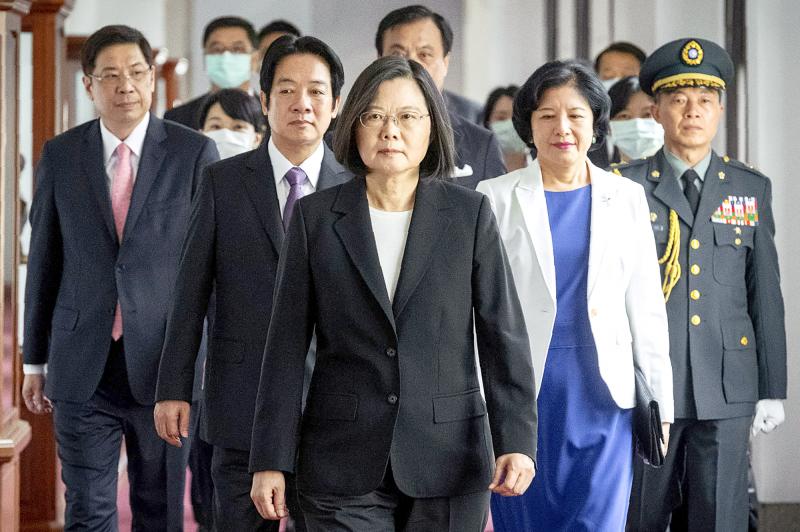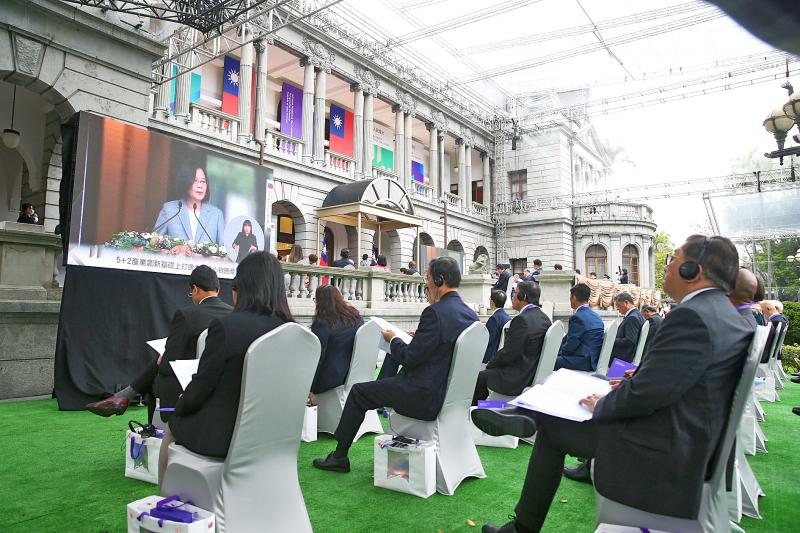President Tsai Ing-wen (蔡英文) in her inaugural address yesterday vowed to continue efforts to push for peace and stability in the Taiwan Strait, adding that the nation would not accept Beijing’s “one country, two systems” framework.
Tsai and Vice President William Lai (賴清德) were sworn in yesterday morning at the Presidential Office Building in Taipei.
Following the swearing-in ceremony, Tsai delivered her second inaugural address from a podium in front of the nearby Taipei Guest House.

Photo: AP / Presidential Office
Tsai spoke on four major topics: industrial development, social safety, national security and the strengthening of Taiwan’s democracy.
Highlighting the importance of optimizing government institutions, she said that the Legislative Yuan is to establish a constitutional amendment committee that would provide the nation with “a platform to engage in dialogue and reach a consensus on constitutional reforms pertaining to government systems and people’s rights.”
“This democratic process will enable the constitutional system to progress with the times and align with the values of Taiwanese society,” she said.

Photo: CNA
Calling it a bipartisan issue, she said that a proposal to lower the voting age in Taiwan from 20 to 18 should be prioritized.
Under the Constitution, only citizens older than 20 have the right to vote in elections.
Tsai said that despite a National Congress on Judicial Reform and making legislative amendments, which serve as “base work for the further improvement” of the judicial system, there is still a gap between what has been achieved in terms of judicial reform and what the public expects.
She promised to continue to listen to different opinions, saying that the public’s dissatisfaction is what drives reform.
A lay judge system needed to be implemented, to help bridge the gap between the people and the judicial system, Tsai said.
While emphasizing the need to “mend” the nation’s social safety net, Tsai said that she would improve the social care system and the work environments of front-line social workers so that they could “identify people who have fallen through” the net.
Regarding controversies triggered by specific cases, she said: “We cannot hold medical agencies or individual judges solely responsible,” and called on the judicial and executive branches of the government to re-evaluate their systems.
A digital development agency is to be created as part of the Executive Yuan’s organizational reform — a process which would include “adjustments to all ministries in line with current needs,” Tsai said.
The establishment of the Control Yuan’s National Human Rights Commission in August would mark a “milestone in our journey to place human rights at the center of Taiwan’s national ethos,” and the beginning of a “new chapter” for the Control Yuan, she added.
As for cross-strait relations, they have “reached a historical turning point,” Tsai said.
Taiwan and China each have a responsibility to “find a way to coexist,” and “prevent the intensification of antagonism and differences,” she said.
Over the past four years, Taiwan has “made the greatest effort to maintain peace and stability in the Taiwan Strait,” she said.
“We will continue these efforts, and we are willing to engage in dialogue with China and make more concrete contributions to regional security,” she said.
However, she added: “We will not accept the Beijing authorities’ use of ‘one country, two systems’ to downgrade Taiwan and undermine the cross-strait status quo.”
Tsai also called for active international participation, saying that Taiwan has been praised throughout the COVID-19 pandemic for its “selfless assistance to the international community.”
“Over the next four years, we will continue to fight for our participation in international organizations, strengthen mutually beneficial cooperation with our allies, and bolster ties with the United States, Japan, Europe and other like-minded countries,” she said.

SEPARATE: The MAC rebutted Beijing’s claim that Taiwan is China’s province, asserting that UN Resolution 2758 neither mentions Taiwan nor grants the PRC authority over it The “status quo” of democratic Taiwan and autocratic China not belonging to each other has long been recognized by the international community, the Mainland Affairs Council (MAC) said yesterday in its rebuttal of Beijing’s claim that Taiwan can only be represented in the UN as “Taiwan, Province of China.” Chinese Minister of Foreign Affairs Wang Yi (王毅) yesterday at a news conference of the third session at the 14th National People’s Congress said that Taiwan can only be referred to as “Taiwan, Province of China” at the UN. Taiwan is an inseparable part of Chinese territory, which is not only history but

CROSSED A LINE: While entertainers working in China have made pro-China statements before, this time it seriously affected the nation’s security and interests, a source said The Mainland Affairs Council (MAC) late on Saturday night condemned the comments of Taiwanese entertainers who reposted Chinese statements denigrating Taiwan’s sovereignty. The nation’s cross-strait affairs authority issued the statement after several Taiwanese entertainers, including Patty Hou (侯佩岑), Ouyang Nana (歐陽娜娜) and Michelle Chen (陳妍希), on Friday and Saturday shared on their respective Sina Weibo (微博) accounts a post by state broadcaster China Central Television. The post showed an image of a map of Taiwan along with the five stars of the Chinese flag, and the message: “Taiwan is never a country. It never was and never will be.” The post followed remarks

NATIONAL SECURITY: The Chinese influencer shared multiple videos on social media in which she claimed Taiwan is a part of China and supported its annexation Freedom of speech does not allow comments by Chinese residents in Taiwan that compromise national security or social stability, the nation’s top officials said yesterday, after the National Immigration Agency (NIA) revoked the residency permit of a Chinese influencer who published videos advocating China annexing Taiwan by force. Taiwan welcomes all foreigners to settle here and make families so long as they “love the land and people of Taiwan,” Premier Cho Jung-tai (卓榮泰) told lawmakers during a plenary session at the Legislative Yuan in Taipei. The public power of the government must be asserted when necessary and the Ministry of

Proposed amendments would forbid the use of all personal electronic devices during school hours in high schools and below, starting from the next school year in August, the Ministry of Education said on Monday. The Regulations on the Use of Mobile Devices at Educational Facilities up to High Schools (高級中等以下學校校園行動載具使用原則) state that mobile devices — defined as mobile phones, laptops, tablets, smartwatches or other wearables — should be turned off at school. The changes would stipulate that use of such devices during class is forbidden, and the devices should be handed to a teacher or the school for safekeeping. The amendments also say